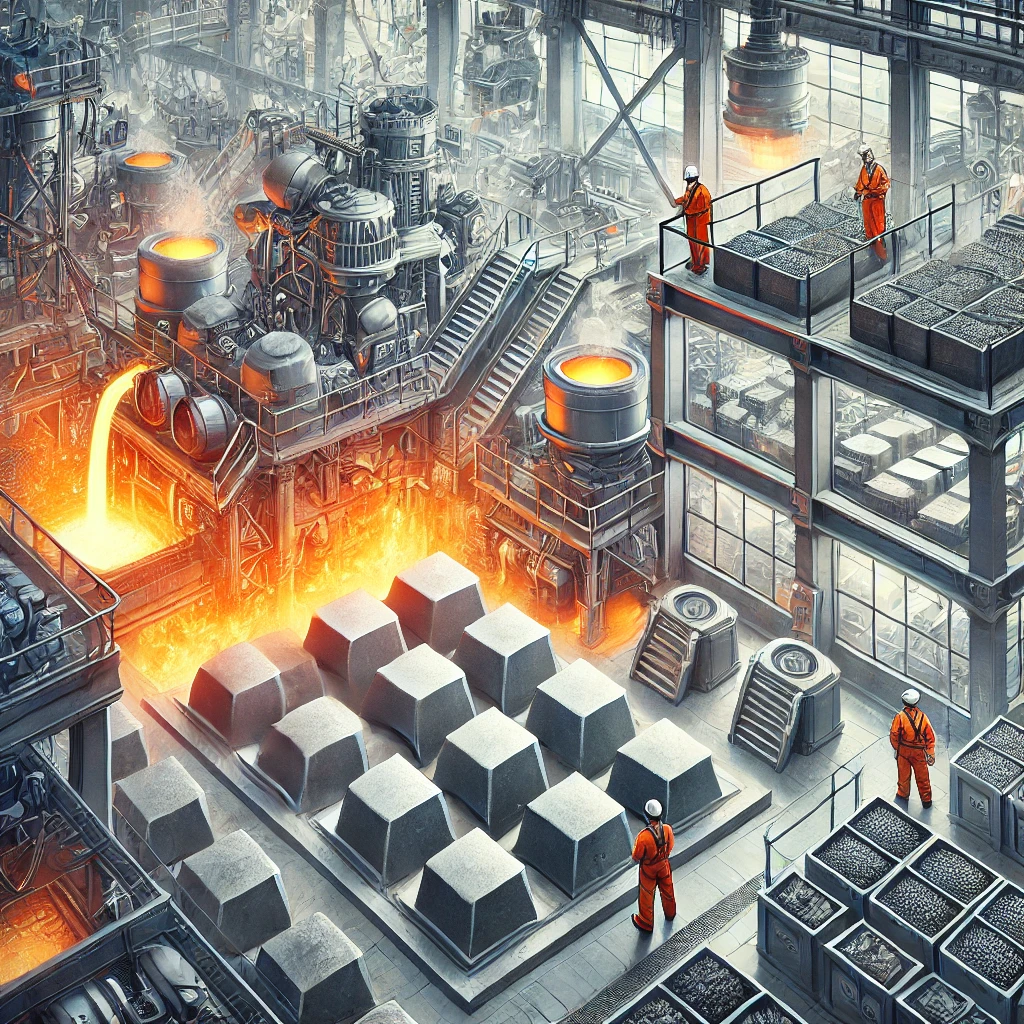The Role of Carbon Anode Blocks in Aluminum Production
Carbon anode blocks are a critical component in the aluminum production process, playing an essential role in the electrolytic reduction of alumina to aluminum. These blocks are made from high-quality petroleum coke and coal tar pitch, providing the necessary conductivity and thermal stability for the Hall-Héroult process. This blog explores the importance, applications, and benefits of carbon anode blocks in aluminum manufacturing, highlighting their impact on efficiency, sustainability, and industrial innovation.
Understanding the Role of Carbon Anode Blocks
Carbon anode blocks serve as electrodes in the electrolysis process used to produce aluminum. During the Hall-Héroult process, the carbon anode blocks are submerged in an electrolyte solution consisting of molten cryolite and alumina. When an electric current passes through the anodes, they react with oxygen in the alumina, resulting in pure molten aluminum and carbon dioxide gas.
Key Functions of Carbon Anode Blocks in Aluminum Production
Conducting Electricity
- Carbon anode blocks provide the conductivity needed to pass electric currents through the electrolyte, facilitating the electrochemical reaction required to extract aluminum.
Sustaining High Temperatures
- The blocks are designed to withstand the extreme heat generated during the electrolysis process, maintaining their structural integrity.
Acting as a Carbon Source
- The carbon in the anodes reacts with the oxygen in alumina to produce carbon dioxide, an essential step in separating pure aluminum from alumina.
Ensuring Process Efficiency
- High-quality carbon anode blocks minimize energy consumption and maximize the yield of aluminum, improving the overall efficiency of the production process.
Manufacturing of Carbon Anode Blocks
Carbon anode blocks are made through a meticulous process that ensures high quality and performance:
- Material Selection: High-grade petroleum coke and coal tar pitch are chosen for their purity and thermal properties.
- Mixing and Forming: The materials are mixed and molded into blocks under high pressure.
- Baking: The blocks are baked at temperatures exceeding 1,200°C to achieve the desired density and conductivity.
- Quality Testing: Each batch undergoes rigorous testing for density, strength, and impurity levels.
Advantages of Using High-Quality Carbon Anode Blocks
Energy Efficiency
- Superior anodes reduce energy losses during the electrolysis process, lowering operational costs.
Increased Aluminum Yield
- High-purity anodes ensure maximum aluminum extraction from alumina.
Reduced Emissions
- Low impurity levels in the anodes minimize the release of harmful by-products.
Enhanced Longevity
- High-quality blocks last longer, reducing the frequency of replacements and downtime.
Sustainability
- Modern anodes are designed to be more environmentally friendly, aligning with global sustainability goals.
Challenges in Using Carbon Anode Blocks
- Carbon Consumption
- The consumption of carbon during the process requires frequent replacement of the anodes, increasing operational costs.
- Environmental Impact
- The production of carbon dioxide during the reaction contributes to greenhouse gas emissions.
- Cost of Raw Materials
- High-quality petroleum coke and coal tar pitch are expensive, impacting the cost of anodes.
Innovations in Carbon Anode Technology
To address these challenges, researchers are focusing on developing advanced carbon anodes:
- Low-Carbon Alternatives
- Innovations are being made to reduce the carbon footprint of anode production and use.
- Recycling and Reuse
- Efforts are underway to recycle spent anodes, reducing waste and lowering raw material requirements.
- Improved Materials
- The development of more durable materials enhances anode longevity and efficiency.
The Future of Carbon Anode Blocks in Aluminum Production
- Sustainable Practices
- As industries move toward eco-friendly solutions, carbon anode production and recycling are expected to become more sustainable.
- Advanced Manufacturing Techniques
- Emerging technologies like AI and IoT are improving the precision and quality of anode manufacturing.
- Integration with Renewable Energy
- Aluminum plants powered by renewable energy sources are incorporating carbon anodes optimized for green energy systems.
Conclusion
Carbon anode blocks are indispensable in aluminum production, providing the conductivity, stability, and efficiency required for the electrolysis process. While challenges such as carbon consumption and environmental impact persist, advancements in anode technology are paving the way for more sustainable and efficient aluminum production. As industries adopt innovative practices and focus on sustainability, carbon anode blocks will continue to play a central role in meeting the global demand for aluminum.
